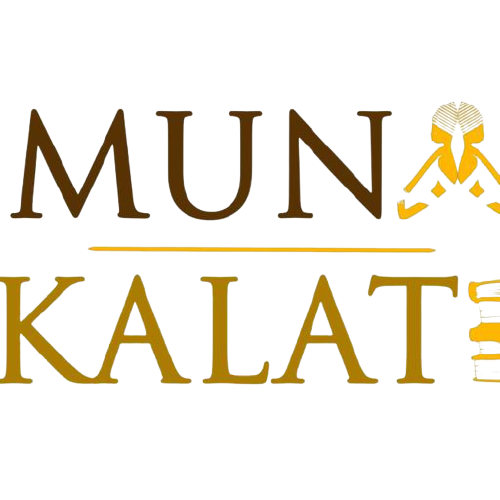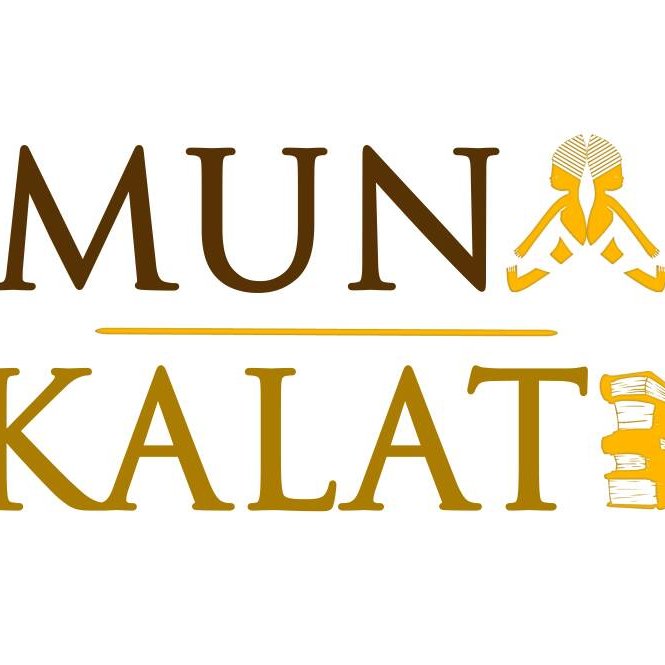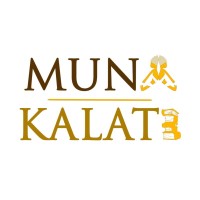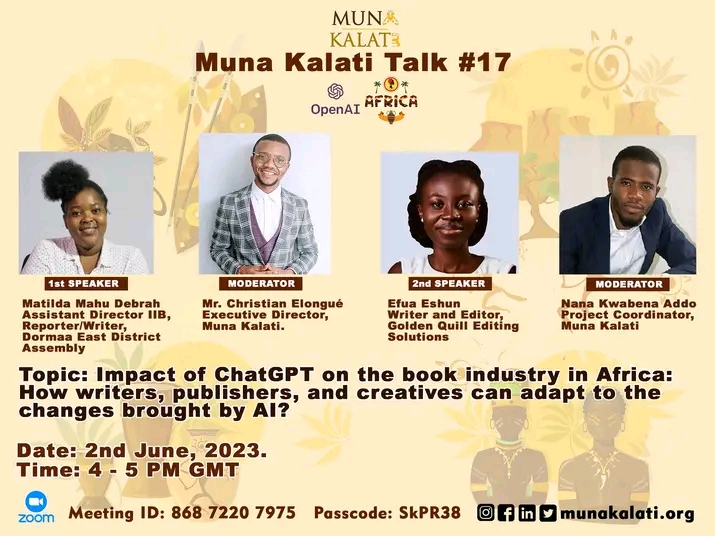On 2nd June 2023, Muna Kalati organized the 17th MK talk, which focused on the impact of ChatGPT in the African book industry, and especially its influence on creativity, storytelling, and cultural identity.
Panelists were:
- Matilda Mahu Debrah, a reporter/writer/communicator/storyteller and the Assistant Director of Dormaa East District Assembly.
- Christian Elongué, the executive director of Muna Kalati.
- Efua Eshun, writer and editor of Golden Quill Editing Solutions.
- Moderator: Nana Kwabena Addo, Project Coordinator, Muna Kalati.
A Statista’s survey found that 23 % of American authors admit to using AI in their work, 47 % were using it as a grammar tool, and 29 % as a tool to brainstorm plot ideas and characters. Under 10% of the authors used artificial intelligence to generate the text of their work.
This survey suggests that generative AI is becoming more popular and widely used in the creative industry not just in the US, but also in Africa and the world.
The future of storytelling with ChatGPT: A Threat or Assurance?
Panelists indicated that storytelling has been a fundamental aspect of African culture for thousands of years, serving as a means of preserving and passing down cultural identity and heritage.Until recently, Chat GPT and other AI generative platforms have increasingly emerged in the creative arts industry as a result of their features to create stories that are as real as if narrated by a human. Even though this could be seen as an advantage, when it comes to efficiency and productivity, there are some inherent risks associated with the use of AI in content creation.
These concerns have raised the need to reconsider the impact of ChatGPT on the art of storytelling and its potential to shape cultural identity and heritage.
Some concerns the panelists highlighted were intellectual property, originality, and the existence of cultural, social, and racial bias in AI-generated content. For example, they asked if AI could produce stories that may reinforce prejudice, negative stereotypes, or myths that could portray Africans as homogeneous. This ideology, they feared, could cause damage to the reputation and dignity of African people and culture by negatively influencing the perceptions and attitudes of the readers.
They also envisage that creative writers might become addicted to the creative use of AI to the point where they lose their creativity skills, intelligence, zeal, and vocabulary and become inadequate without the AI system.
Potential Impact of ChatGPT on Cultural Identity and Heritage
The Panelists agreed that Generative AI cannot fully identify how Africans tell their stories because African stories are embedded in moral lessons that require fully-fledged creative works that are required to bring out African culture and folklore. Although AI is trained in story writing, it cannot be guaranteed that the story will meet the standards of being empathetic, interesting, funny, or humorous.
The generated story may also be limited to fictional stories while lacking the genuineness of lived stories that are crafted from true life experiences. In the end, the generated story is unrelatable to the typical African expression and tone.
Generative AI can again produce outputs that are inaccurate, incomplete, or misleading. It also generates outputs that are harmful or offensive by ‘fabricating’ or ‘hallucinating information’ that may

Medici Generici servizio di assistenza medica a domicilio Roma
Il nostro team fornisce un servizio di assistenza sanitaria domiciliare, garantendo professionalità e comfort per i pazienti a Roma.
violate ethical or legal norms, especially when it lacks human oversight or quality control. This dictates how important it is to verify and validate the outputs of generative AI to ensure they meet the desired standards and expectations.
The Case of ChatGPT and Copyright Ownership
The panelists added their concerns about Intellectual Property and ownership rights with questions about whether any creative work created by AI requires its own ownership. They also questioned whether any revenue generated by AI needs to be solely credited to the creative expert or to the developers of the AI.
The issue of plagiarism has the potential to cause conflict between story writers when any AI mistakenly generates a writer’s work that happens to be already protected under copyright laws. In effect, a writer may be found wanting and suffer severely out of ignorance when AI ends up tapping into the same idea produced from the original source.
The panelists noted that it is becoming more difficult to differentiate between creative content that has been created using AI and creative content that has been created using exclusively human intelligence, which indicates that “we are moving gradually into an era where intellectual rights will increasingly become difficult to ascertain”.
Recommendations
Panelists encouraged story writers to approach Generated AI as a framework for guidance to generate story ideas, plot lines, and character names.
Generated AI can provide a template for a writing idea and allow story writers to explore their own creativity and imagination.
Story writers need to reassure themselves that human writers are 100 % guaranteed with less error, unlike AI technology, and reiterate that human resources are more reliable and deserve more trust than AI, which only depends on human command to function.
They concluded that Generative AI is here to stay and should not be seen as a threat. African story writers and illustrators rather need to find ways of integrating it within their corporate and individual practices to accelerate and complement human effort in contextualizing human thinking.
All in all, the essence of Generative AI is to enhance the children’s book industry and Africa as a whole through productivity to maximize speed.
Call To Action
The panelists called on book industry players to look at the bigger picture ahead of time in order to manage the issue of ownership rights related to AI products.
They also called for the preservation of human voice and original thought in the creative industry, stressing that it is difficult to replace human thinking with AI due to its programmed nature to reproduce, which is based on the specific instruction or information it has received.Christian Elongué encouraged story writers, illustrators, and publishers to join Muna Kalati as an ally to champion the promotion of African children’s storybooks. At Muna Kalati , we recognize and celebrate great achievements of industry players such as Mariska Araba Taylor-Darko and Katie Smith Milway.




